So you ended up catching the fitness bug? You’re now living the “healthy” lifestyle, training daily and eating right… most of the time.
At first the physical rewards from getting fitter, leaner and losing weight to the circulating endorphins & gratifying feeling after each workout, were powerful enough to keep you motivated and make you feel on top of the world. It was as if almost nothing could stop you getting fitter, faster and better.
A year or more passes by and ….BOOM – you’ve hit that dreaded “plateau” everyone was banging on about. But it’s okay you think, I can worked past this, let’s get experiment with different macros, training types and cutting the calories, oh hey why not throw in an extra gym session while we’re at it – that will work.
The progress continues and you continue to get you fix – this time though it seemed more short lived, as a few months later and the plateau is back with the vengeance and it seems you’ve run out of time, energy and ways to keep progressing.
12 Signs You’re Overtraining
“A plateau is a state of little or no change following a period of progress”. Physical and mental plateaus are common amongst many athletes.
But a training plateau is not to be confused with over training. So now is the time to ask yourself… are you at a plateau or are you over training?
- Can you miss a training session?
- Does missing a gym session make you irritable, angry or anxious?
- A rest day… what’s that? Rest is only for the weak.
- Do you turn down social events to train and schedule life around your gym routine?
- The highlight of your day is the gym or meal times
- Are you facing poor recovery, muscle aches?
- Are sleepless nights and bouts of insomnia now a norm?
- Do you suffer from constant bloating and what you may think is IBS or food allergies?
- Are you no longer menstruating and your periods have stopped?
- You’re having more and more cravings for sweet foods, even more so late at night.
- You’re seeing a lack of progress and even weight gain despite exercising everyday
- You’re tired and fatigued a lot of the time suffering from “mind fog” and lack of concentration in the day.
If the answer is yes to the above, you my friend have an addiction.
“But exercise is a healthy addiction right?” – Anything that is in excess and you have a psychological and physiological dependence for is NOT healthy. Despite the mental side of this which I’ve mentioned in previous blog posts, the equally important side of this is what you are doing to your physical health, metabolism and future.
For us females over training effects can be somewhat detrimental to our health and fertility in later life, of which is something I am myself experiencing and have chosen to ignore for many years.
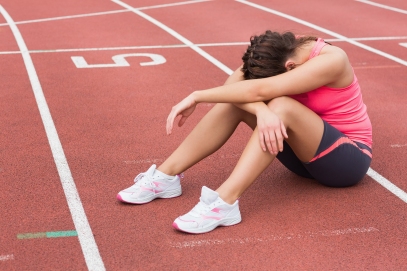
How Do I Know If I Have a Hormone Imbalance?
Where’s My Period Gone?
Hormone imbalances at first stages can be hard to spot, but if you are over training the first thing you’ll notice is a loss of periods – also known as amenorrhoea.
Women who are athletes or exercise excessively on a regular basis are at risk of developing this athletic amenorrhoea from the side effect of low body fat levels and the effects exercise has on the hormone system.
“A period… what’s that”? Is pretty much how I felt whenever someone mentioned their time of the month. It’s safe to say it’s been almost 5 years since I had a proper period and for females who lose weight quickly and over train this is the first thing to wave goodbye to and unfortunately the solution may not just be as simple as “oh when I’m ready to have a baby I’ll stop training or I’ll put on weight”.
But what is it that makes our periods disappear, and why is it so dangerous? More importantly… How can we get them back without stopping exercise and piling on the pounds?
How Can Overtraining Cause a Hormone Imbalance & How Can Overtraining Stop Periods/Menstruation?
Now I won’t patronise you by diving into the menstrual cycle – we already know that the ovaries make oestrogen and progesterone to prepare the body for pregnancy – which if it does not happen results in a period/ drop in hormones…
But how can overtraining actually alter our hormone levels and stop periods?
So before I dive into why your hormones are imbalanced and how to try and take steps to resolve this, let me first tell you a bit more about a chemical called pregnenolone.
Sex Hormone Production
What is Pregnenolone and Why is it Important?
Well, it all starts from the command centre in the body and the body’s regulatory system – the hypothalamus and pituitary gland. The hypothalamus and pituitary glands are what keep our body in a state of equilibrium, they do this by sending neurons and signals to secrete hormones and dictate reactions in our endocrine and nervous system during external and internal environmental changes ( e.g. if you are too hot, too cold, if your blood sugar rises etc.). They control and govern the endocrine system and regulate hormone production.
In hormone production the hypothalamus and pituitary glands signal for cholesterol to be broken down (you may not already know this but cholesterol is the starting point for making all our sex hormones).
Cholesterol is then broken down to make a substance called Pregnenolone.
Pregnenolone is the chemical precursor the body uses to make DHEA – an important chemical that goes on to produce major sex hormones including oestrogen and testosterone.
Exercise & Cortisol – What is Cortisol?
If this isn’t you first article on overtraining then you’ll already know cortisol is also known as the stress hormone and a unfortunate causes of excess fat around our abdominal area – yes that wobbly gut.
Moderate exercise forces the body to deviate from its natural set-point and therefore to the body, is perceived as a type of stress. From a hormone perspective in response to exercise, or as soon as we become stressed, the hypothalamus tries to regulate the body by signalling a release of cortisol and adrenaline from our adrenal glands. Similarly, during a stressful situation, these signals are what cause a nervous system response with activity in the form of sweating, increased heart rate and breathing changes.
For many of us who do exercise and over train, we may also suffer from external stress in other areas of our lives – from a hectic work schedule to family and relationship problems and when we produce cortisol, whether that be from exercise or stress in everyday live there are both internal and external physical responses driven by nervous system and hormone activity. Once circulating in the body for a long period of time we experience further physical responses such as an increase in blood sugar, digestive issues and also a drop in our immune system.
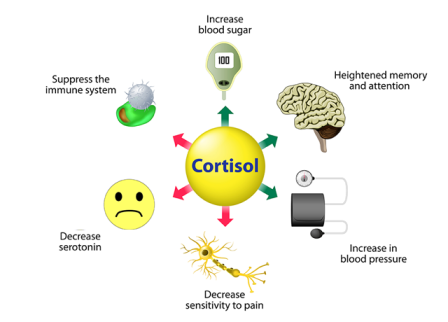
In moderation this release of cortisol release is handled by the body, but when we move into overtraining or life brings excess stress excess cortisol production causes big problems.
Cortisol and the Pregnenolone/ Progesterone Steal
The pregnenolone steal isn’t an official medical term doctors will use but this term is used to describe how our bodies cope with stress and the production of excess cortisol – it’s the human stress response.
I mentioned before that pregnenolone is broken down from cholesterol and used to make progesterone and DHEA – the trouble is the progesterone made from this pregnenolone is also used to make dreaded cortisol!
It’s pretty easy to see from here how excess stress can go on to imbalance our hormone production – when we get stressed, whether this is immediate physical stress from exercise or stress over a long period of time (such as a stressful job), the hypothalamus tells the body to produce cortisol. In order to produce extra amounts of cortisol from physical & physiological stress (e.g. exercise, digestive stress, lack of sleep etc.) the body’s only option is to use the pregnenolone precursor to make more progesterone and in turn more cortisol, moving pregnenolone away from sex hormone production and stealing the supply.
BOOM – lots of cortisol can now be produced but there is suddenly a lack of pregnenolone available for any other hormones to be produced – mainly the all important DHEA which goes on to make estrogens and testosterone.
Pregnenolone – get your own and stop stealing mine!
Okay so that’s a lot of science but hopefully this makes sense – the body uses pregnenolone to make progesterone and DHEA, which are used to make cortisol and sex hormones. When we get stressed, all of the stress internal and external in the body causes the hypothalamus to signal to the adrenal glands that more cortisol needs to be produced. As a result pregnenolone favours the cortisol production pathway, meaning there is now not enough to produce DHEA and our sex hormones.
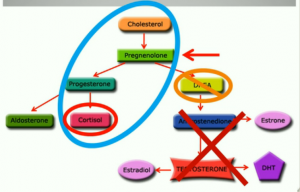
From here we get an imbalance of hormones which can wreak havoc not only in our reproductive system, but if ignored can eventually causing infertility, whist also causing issues in digestion, sleep and within our metabolism & body composition.
How Can I Balance My Hormones From Overtraining and Stress?
So now you know how your overtraining hasn’t just caused a “plateau” that you can easily overcome with a few rest days, a hormone imbalance is a serious issue that is not only stopping you reaching results but is ultimately driving you to the ground from digestive issues (IBS, lactose intolerance etc.) and lack of sleep (insomnia, low recovery rates etc), whilst also be affecting your reproductive system for later life. There are however different stages of overtraining and the good news is that almost nothing is irreversible and you can work to change things.
But… it won’t be easy. Trust me it will probably be the hardest thing you’ve ever had to face and even I am only just starting to make positive changes within my training to try and get my health on track.
What Should I Do to Balance My Hormones?
- Cut Down
So first things first you need to look at your lifestyle and your overtraining… yes that means the dreaded cutting down.
Exercising less often or choosing exercise which is less intense can help reduce the stress from exercise. This means less cardio, and perhaps looking into other forms of exercise such as:
- Weight resistance routines
- Yoga or Pilates – if you’re a runner or love HIIT – this may not sound appealing but give it a go for a month or two and work on increasing flexibility. Yoga and Pilates may be more challenging than you think and have been shown to help anxiety and lower stress levels from everyday life.
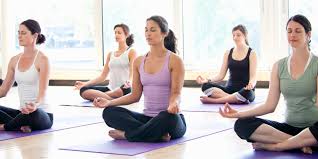
- Your Diet
If your hormones are all out of wack it wouldn’t surprise me that your diet is probably also lacking – whether that’s from cravings or the fact that you simply aren’t eating enough. You need to be feeding and fuelling your body with healthy nutritious foods.
To help get your hormone on track and reduce the effects of overtraining eating foods high in protein, magnesium, zinc and calcium is vital.
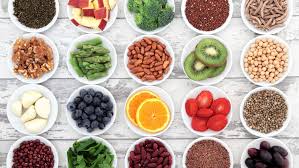
Greens & Grains – Get Your Fruit & Veg
I would first make sure you have a healthy diet full of greens, fibre and micronutrients. When we exercise we remove minerals and our demand for not only macro nutrients (that’s your carbs, fat and proteins) but micronutrients is increased. So getting a diet high in vitamins in minerals is essential – especially for recovering those damaged adrenal glands.
Healthy Fats
Omega 3, 6 and 9 are also important in recovering your metabolism, glands and cells. Good sources of omega oils can be found in fish but also ready available in products such as Flax Seed powder, which you can buy online or from your local supermarket.
Apart from being rich in vitamin B, iron, magnesium, zinc, potassium and vitamin E, flax seed in particular has been mentioned to help hormone imbalances due to their high levels of phytoestrogens which once in the body can not only reduce excess estrogens (if that is an issue but this is less likely for those who over train) but also help hormone imbalances in other parts of the body.
Calcium & Vitamin D
When we don’t have periods our bone mineral density can be at risk which in later life can cause issues such as osteoporosis. Therefore its important to make sure you are getting enough calcium and vitamin D which may mean getting a good supplement.
If you feel your diet is still lacking getting a good supplement plan may be what you need to ensure sure you are getting enough of the all essential micro nutrients and minerals. However supplements should NEVER replace real food.
Overall – my advice would be to slowly increase your calories but make sure you are getting enough micro and macro nutrients at the right time of the day.
- Don’t skip breakfast
- Consume most of your calories earlier in the day
- Eat Enough Protein & Carbs in your meals
- Eat Regularly – 6 small meals or 3 meals and 2 snacks. Eating regularly and consuming adequate protein with each meal will help maintain a steady blood sugar level which will also help with cortisol production (the two are proportionally linked – if your blood sugar increase then so does your cortisol).
And remember – you don’t have to control what you eat ALL the time everything is fine in moderation so if you want that piece of cake – make sure its not just because you’re hungry and let your body have it you probably deserve it!
- Rest, rest and more rest!
If you over train you will definitely know what insomnia is. Insomnia in athletes is common because of the excess cortisol and adrenaline that is circulating following intense workouts.
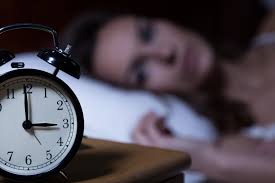
But a lack of sleep not only increases stress further, it also reduce your recovery rate, increases insulin resistance, hunger and cravings, messes up your digestion and can contribute to depression & anxiety.
In order to try and combat stress and inflammation sleep is essential so my advice would be to:
- Stop exercising late at night
- Don’t eat too much late at night
- Practice meditation, mindfulness or yoga before bed
- Try supplements such as zinc citrate, magnesium citrate, 5-HTTP and tryptophan before bed – these can help to increase serotonin and melatonin levels which will also be low and depleted from you’re over training.
- Look to relax more and address surrounding issues through stress management.
- I’m stressed about… being stressed! Stress management
Stress from exercise is one thing but often we find exercise has sometimes been there as a coping mechanic or way to channel negative energy from stress in other areas of our lives. Mental and emotional stress is just as important as the physiological stress and we face these stresses in everyday life from problems at work, problems at home, to anxiety and fear – whatever the underlying cause you need to address it.
From counselling once a week where you can learn about CBT and new behavioural patterns to just writing a journal – there are ways you can really look into what is driving your stress and more importantly how to escape it.
- Other Supplements
Although this isn’t something I have tried it’s advised by doctors to start the combined oral contraceptive pill or hormone therapy if dietary changes and reduced exercise do not result in regular menstruation returning. If you want to hear more I would strongly advise getting expert advice from your GP.
I am currently looking into the use of natural supplements to help hormone production and balance. There are many supplements that may help hormonal balances but a few I have read about are:
- Flax seeds and healthy fats
- Vitex and Chaste berry
- Dong Quai
- Pregnenolone supplements
- MACA Root, Panax Ginseng & Black Liquorice Root
Dong Quai is currently on its way to me and is known to be a safe, natural and powerful Chinese herb suggested to support healthy menstrual cycles. It’s thought to promote balance of female estrogens hormones and emotional health during menopause and perimenopause. It is also thought to help low iron levels and make you feel happier! Although the mechanism is somewhat unclear and I won’t be providing the science behind it in this article.
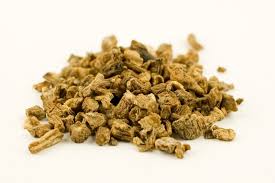
MACA Root you may have already heard of maca powder with the super food craze last year, but maca root has also been shown in some studies to help premenstrual syndrome whilst also providing adrenal nourishment – panax ginseng and liquorice rot also two other supplements that are thought to have similar effects. It is thought in the body that taking soy and phytoestrogens can help mimic the effects of estrogens – maca on the other hand can help to increase the body’s own insulin production – although like most supplements it’s hard to prove in studies the true effects.
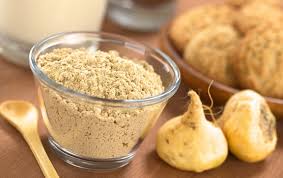
Vitex/Chaste berry for Hormones
Vitex/chaste berry comes from a chaste berry fruit and is thought to be a herbal remedy for premenstrual syndrome to increase the luteinizing hormone and modulate prolactin which can help to balance our estrogens and progesterone levels. It is thought that when combined with dong quai these two supplements work well together to help balance hormones.

Pregnenolone Supplements
By supplementing with pregnenolone it makes sense that this could help a greater production of DHEA and therefore increase the production of both estrogens and testosterone – DHEA is often a preferred choice however it can be pretty expensive and hard to get a hold of. I am looking at try pregnenolone however there are some risks and side effects.
First of all don’t take at night as they can cause insomnia if taken to late, too high a dose can also cause anxiety, nausea and irritability, with additional skin problems such as acne whereby more androgens can be produced. I do not suggest taking this supplement as it is one I am more reluctant to try due to the many side effects and should be one to consult your doctor about before trying.
Getting That Balance
They say everything in moderation and that is only really calling true to me now. My over training is still pretty up there but once you realise the true effects on your mental and physical health changing is just the next step to bettering yourself and taking care of your health and body.
Hopefully this article has provided some information you needed to know – whether you wanted to hear the words “reduce your exercise” or not. As for the supplements – just because they are deemed safe doesn’t mean they are safe for you. You should always opt for herbal remedies or consult your doctor before taking any supplements to regulate hormone control. Saying that, I’m one to try and experiment with my body and chemical reactions – so I will keep you updated.

December 2, 2017 at 9:02 pm
Hey brilliant article, you’ve just described me to a T, would love to keep in touch and see how your getting on!
Although it’s great to know someone else is going through what I’m going through it is also horrible, it’s so hard to find help, hope you are recovering and if you can offer any support I’d be grateful!
December 2, 2017 at 9:26 pm
Hey Nicole! Sure have you got Instagram? Jenny_watt pop me a message I’ve got quite a bit I really need to disclose in terms of you looking after yourself – from my own mistakes xxx
July 9, 2018 at 8:41 pm
this is also me to a T-going through the dreaded what the heck is happening to my body-almost as if my body is angry at me for all the exercise. Very discouraging and depressing. People have been telling me to take days off, but I am a fitness instructor, so it is very hard, and honestly I look forward to my workouts every day.
July 11, 2018 at 8:54 pm
I’m very similar – just takes cutting down a bit and trying to do exercise that doesn’t stress your body as much! Reverse dieting is a great way to start getting your metabolism back up to scratch and fuelling your body properly without a ton of weight gain! Xxx